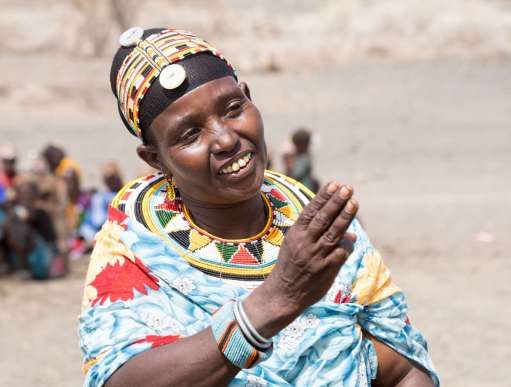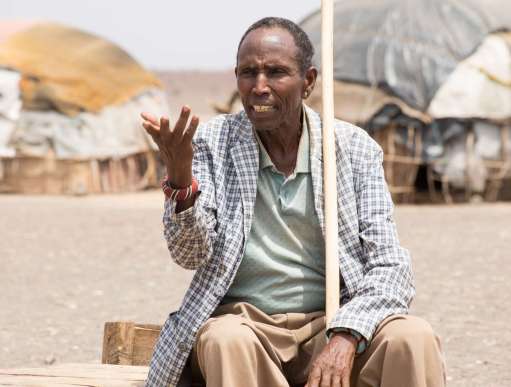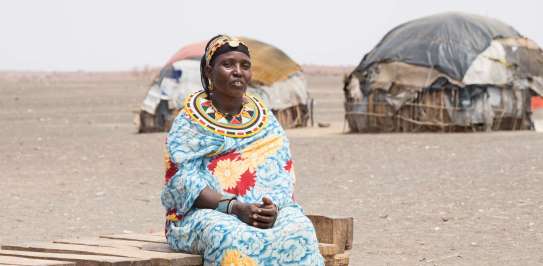According to the World Food Programme, the number of people facing food shortages has jumped from 135 million to 345 million since 2019. Up to 50 million people in 45 countries are just one step away from famine.
In the Horn of Africa, four failed rainy seasons over the past two years has led to the worst drought the region has seen in 40 years and left over 20 million people in parts of Ethiopia, Kenya and Somalia struggling with food shortages. It is estimated that a person is dying of hunger every 48 seconds in the region as harvests fail and valuable livestock perish.
In this blog, we hear from people in the region about the challenges they are facing and how Christian Aid, with support from Irish Aid, is providing them with support to help them cope.
"After years of drought, many goats in this area have died. I don't have any crops so rely solely on my livestock and they need rainfall and pasture.”
38-year-old herder Kubo Chamuset lives in Kurkum, Laisamis, Marsabit county, northern Kenya with her husband and 9 children. Laisamis is one of the areas of Kenya worst hit by drought and 1 in 3 people are severely malnourished.
Kubo survives by rearing goats, sheep and a camel, but she lost over half of her herd because of the harsh conditions resulting from the devastating drought that has gripped the wider Horn of Africa region.
Across the region, nearly 9 million livestock, which families rely on for their livelihood and sustenance, have perished including 2.4 million in Kenya alone.
“When there was no drought, animals were in good condition because there was lots of grass and water. Livestock prices were profitable,” says Kubo.
“The drought means there isn’t enough food or water for the animals. They are all in a poor condition, we can’t get a good price for them at the market,” she adds.
According to Kubo, the drought has led to food and water shortages in her area, reduced the quantity and quality of the pasture available for the remaining livestock and even forced some people to leave the area.
Image credits and information

“Our water is 5 kilometres away from the village. Now that the donkeys have died, people carry water on their backs,” Kubo says.
Compounding the situation further, the price of food and basic goods have increased in recent months in her area, making them increasingly difficult to afford.
“The price of beans has increased by half and the price of cooking oil has almost doubled,” Kubo says.
Thanks to emergency funding from Irish Aid, Kubo’s family will receive a total of three, monthly cash grants of approximately €76 in local currency through Christian Aid’s local partner Pastoralists Community Initiative and Development Assistance (PACIDA). This money will allow Kubo to buy food and other essentials for her family. Nearly 1,000 families across Marsabit county will receive this support through our local partner thanks to funding from Irish Aid.
The money I received has helped my family considerably. We can now afford to eat a full dinner
Isacko Esimatgalboho who also lives in Kurkum and also received cash from Christian Aid’s local partner said: “If it were not for this cash, my community would have really suffered or died of hunger. Thank you to everyone who made this possible. May God bless you.”
Image credits and information

Kubo notes that while the support her family have received has helped, they still worry for what may lie ahead.
“We will need further support to help us survive until the next rains,” Kubo says.
However, it is not known for certain when those next rains will fall. Latest forecasts indicate that the upcoming rainy season between October and December is also likely to fail, meaning the situation looks set to get worse.
With the scale of the crisis that is engulfing the region, more funding is urgently needed to help save lives. That’s why Christian Aid Ireland alongside six other of Ireland’s leading international aid charities that make up the Irish Emergency Alliance have launched an urgent hunger appeal to reach those at risk of famine.
From investing in water purification kits to dispersing animal feed and medicine, Christian Aid is supporting over 300,000 people. To save lives and give people hope, please donate what you can today.



